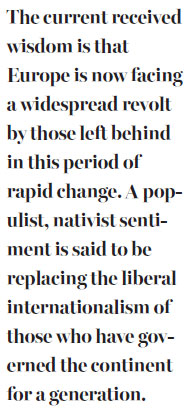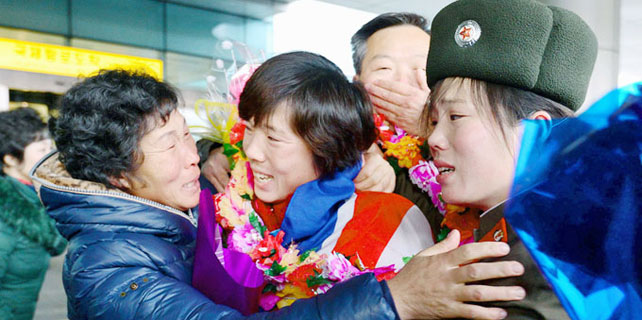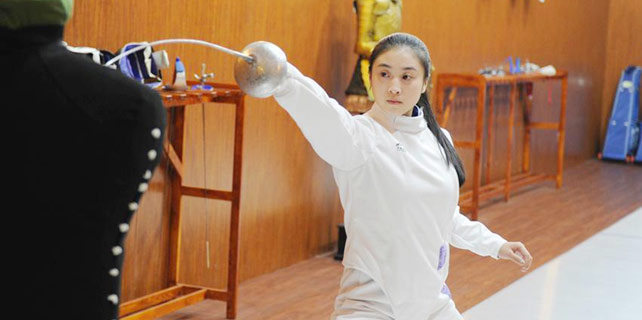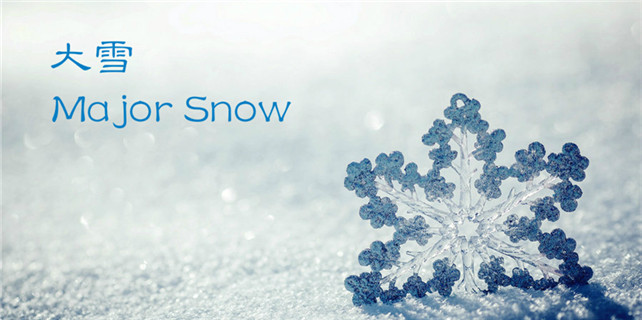Europe's shaken belief in its stability
Contradictory poll results sow seeds of doubt throughout a continent more accustomed to predictability
Looking back over 70 years of post-war history, most Western Europeans would conclude that political instability is something that happens somewhere else.
Now, however, following the Brexit vote in Britain, a referendum upset in Italy and the prospect of untested populist politicians coming to power elsewhere in Europe, a mood of uncertainty has gripped the continent.
Europeans look warily across the Atlantic to assess the possible consequences of a Donald Trump presidency, and toward Asia, where the rising power of China has surpassed that of the old continent.
We have short memories, of course. The postwar era was not quite the steady ride toward the golden uplands that is now recalled by those who yearn to go back to it.

In the early 1970s, the Western world was facing the economic consequences of an oil price shock that quadrupled the cost of energy and stalled a period of rapid growth. In Europe, Spain and Portugal were still run by anachronistic dictatorships, while a junta of incompetent colonels was in power in Greece.
Germany and Italy were threatened by domestic terrorism of the left and right, and even in sedate old Britain a group of superannuated officers and spies plotted a military coup against the Labour government of the day.
And, for a further decade and a half, Europe was to remain divided between East and West, living under the threat that a false step or a miscalculation could lead to nuclear war.
At the end of the Cold War, the now much-criticized European project led to a period of cooperation and integration between the previously divided halves of the continent.
The current received wisdom is that Europe is now facing a widespread revolt by those left behind in this period of rapid change. A populist, nativist sentiment is said to be replacing the liberal internationalism of those who have governed the continent for a generation.
It is a theory, of course, that is only as good as the latest election result. Brexit and the failure of Italian Prime Minister Matteo Renzi to gain backing this month for his constitutional reforms appear to affirm the strength of a Europe-wide populist backlash.

But, if the narrow defeat of far-right presidential candidate Norbert Hofer in Austria is followed by election victories for Angela Merkel in Germany and a centrist of the left or right in France next year, the picture might look very different.
Whatever the outcome of another year of political uncertainty after the shocks of 2016, Europe's leaders, whoever they turn out to be, will have to face the challenge of changing geopolitics.
European strategists believe the relationship with China will be crucial, particularly in view of the antagonistic tone Trump has adopted toward Beijing even before he enters the White House.
Sebastien Goulard, a French consultant on China-Europe relations, recently wrote that candidates in France's election next April must pay more attention to links with China.
He said the favorite, the center-right's Francois Fillon, had mostly portrayed China as a threat.
"Although he is regarded as a supporter of economic liberalism, Fillon wants Europe to pursue anti-dumping policies toward China," Goulard wrote in the Asia-Pacific magazine The Diplomat. "Furthermore he fails to see China's investments in the innovation sector as an opportunity for France and Europe."
Meanwhile, Alexander Stubb, a former Finnish prime minister, noted recently that Europe was coming to terms with the fact that China is buying European businesses in all shapes and forms.
"Europe should not complain," he wrote in the Financial Times.
"Europe should not burn bridges by taking knee-jerk protectionist measures," he wrote. "Few predicted that the Chinese would emerge as advocates of free trade while the US turned inward."
These are sentiments that would be widely shared in China. Whether they prevail will depend on the choices made by Europe's increasingly divided electorates.
The writer is a senior editorial consultant for China Daily UK.
(China Daily European Weekly 12/09/2016 page10)


















